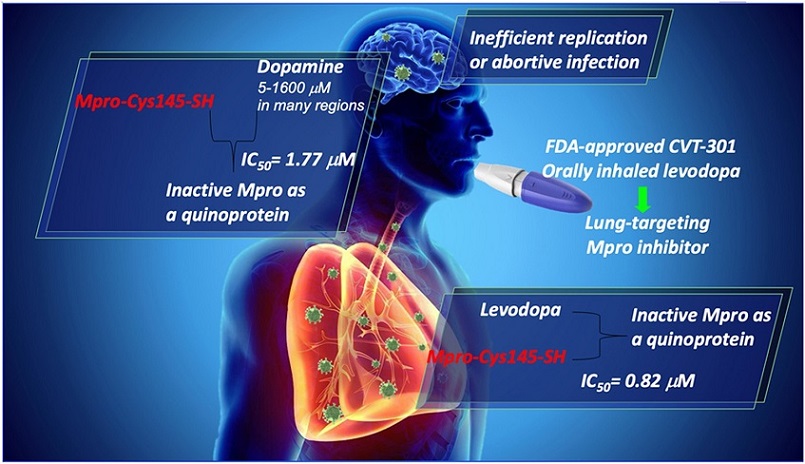Nikhil Prasad Fact checked by:Thailand Medical News Team May 11, 2024 1 year, 5 months, 5 days, 17 hours, 41 minutes ago
COVID-19 News: The emergence of severe acute respiratory syndrome coronavirus 2 (SARS-CoV-2) and its associated disease, COVID-19, has led to a global health crisis. While the virus primarily affects the respiratory system, there have been observations of neurological involvement, prompting investigations into how SARS-CoV-2 interacts with nerve cells. Notably, studies have reported inefficient replication or abortive infection of SARS-CoV-2 in the central nervous system (CNS), sparking interest in understanding the underlying mechanisms. This
COVID-19 News report delves into recent research conducted at Anhui Agricultural University in Hefei, China, and the University of Surrey in Guildford, UK, shedding light on the inhibitory effects of dopamine and its precursor levodopa on SARS-CoV-2 main protease (Mpro), a key enzyme for viral replication.
 Graphical Abstract - Dopamine and levodopa preferentially react with the active site, Mpro-Cys145-SH, CVT-301(orally inhaled levodopa) could be repurposed as an Mpro-inhibitor of COVID-19 that targets the lung.
Understanding SARS-CoV-2 Neurotropism
Graphical Abstract - Dopamine and levodopa preferentially react with the active site, Mpro-Cys145-SH, CVT-301(orally inhaled levodopa) could be repurposed as an Mpro-inhibitor of COVID-19 that targets the lung.
Understanding SARS-CoV-2 Neurotropism
The CNS can be a target for SARS-CoV-2, with potential entry routes including the olfactory and trigeminal nerves, disrupted blood-brain barrier, and others. However, despite the presence of the virus's receptor ACE2 in nerve cells, studies consistently show low viral RNA levels or antigen presence in the brain of COVID-19 patients. This suggests a phenomenon of abortive infection, where viral replication in nerve cells is inefficient or halted. Various experiments, including those using human-derived neuronal cultures and animal models, have highlighted this aspect of SARS-CoV-2 neurotropism. The exact mechanisms leading to inefficient replication in nerve cells have remained elusive until recent research findings shed light on the role of dopamine.
Dopamine as an Mpro Inhibitor
Dopamine is a neurotransmitter abundant in various regions of the brain, with concentrations ranging from sub-micromolar to millimolar levels. The research conducted focused on how dopamine and its precursor levodopa interact with SARS-CoV-2 Mpro, an enzyme crucial for viral replication. The study found that both dopamine and levodopa, at sub-micromolar to low micromolar concentrations, inhibit Mpro activity in a time- and dose-dependent manner. This inhibition occurs through the formation of a quinoprotein, where dopamine-o-quinone reacts preferentially with the active site thiol Cys145-SH of Mpro. Further analyses using mass spectrometry confirmed the covalent conjugation of dopamine or levodopa o-quinone with Cys145-SH, elucidating a potential mechanism for the inefficient replication observed in nerve cells.
Implications for COVID-19 Treatment
The discovery of dopamine and levodopa's inhibitory effects on SARS-CoV-2 Mpro opens new avenues for COVID-19 treatment. Notably, orally inhaled levodopa of which there are many such approved such drugs at the moment for Parkinson's disease, could be repurposed as Mpro inhibitors targeting the lungs. This is significant as inhaled pulmonary drug delivery is highly effective for lung-related disea
ses. Leveraging the existing safety profile and efficacy of
orally inhaled levodopa, researchers propose urgent investigations into its potential as a lung-targeting COVID-19 therapy.
Discussion on Research Findings
The research findings provide crucial insights into the neurobiology of SARS-CoV-2 infection and potential therapeutic interventions. The inefficient replication observed in nerve cells could be attributed to the inhibitory effects of dopamine and levodopa on Mpro, disrupting the virus's life cycle. This aligns with previous observations of limited viral replication and absence of cytopathic effects in infected neurons. By targeting Mpro, CVT-301 holds promise as a novel COVID-19 treatment, especially given its existing FDA approval and suitability for lung delivery.
Conclusion
In conclusion, the study's findings linking dopamine and levodopa to Mpro inhibition in SARS-CoV-2 infection shed light on the complex interactions between the virus and the CNS. This opens avenues for exploring repurposed drugs like CVT-301 as potential COVID-19 therapies with lung-targeting capabilities. Further research and clinical trials are warranted to validate these findings and translate them into effective treatments for combating COVID-19 and its neurological implications.
The study findings were published in the peer reviewed journal: Free Radical Biology and Medicine.
https://www.sciencedirect.com/science/article/abs/pii/S0891584924004374
For the latest
COVID-19 News, keep on logging to Thailand Medical News.
Read Also:
https://www.thailandmedical.news/news/covid-19-news-weill-cornell-study-finds-that-sars-cov-2-infects-and-triggers-senescence-of-dopamine-neurons-metformin-helps
https://www.thailandmedical.news/news/breaking-covid-19-news-italian-study-shows-that-sars-cov-2-infects-dopaminergic-neurons-and-hampers-dopamine-production
https://www.thailandmedical.news/news/study-proposes-that-sars-cov-2-induced-neuroinflammation-causes-dopamine-dysfunction-and-transmission-imbalance,-contributing-to-long-covid
https://www.thailandmedical.news/news/breaking-coronavirus-news-saudi-arabia-study-shows-that-dopamine-receptors-might-be-targeted-by-sars-cov-2-coronavirus
